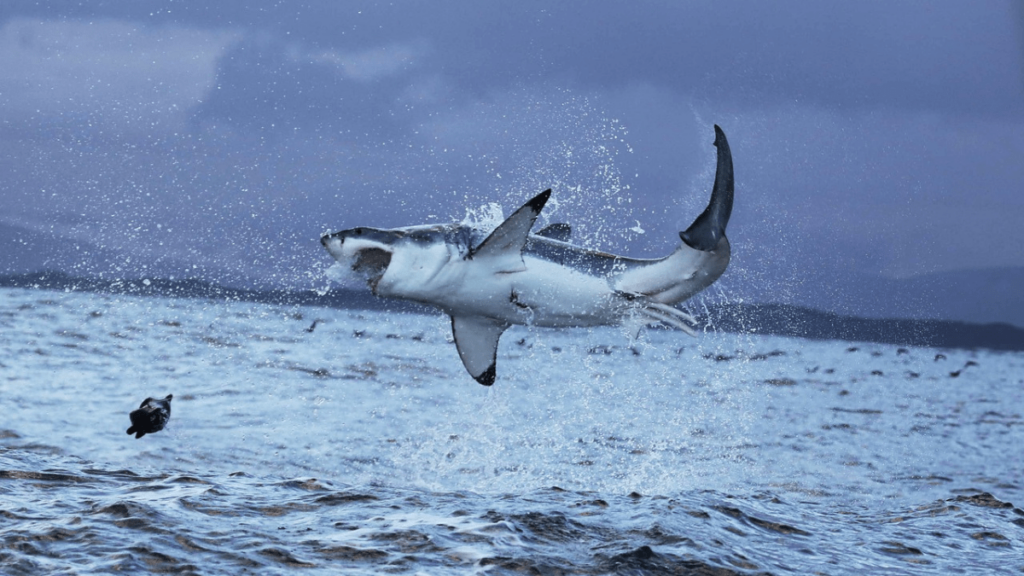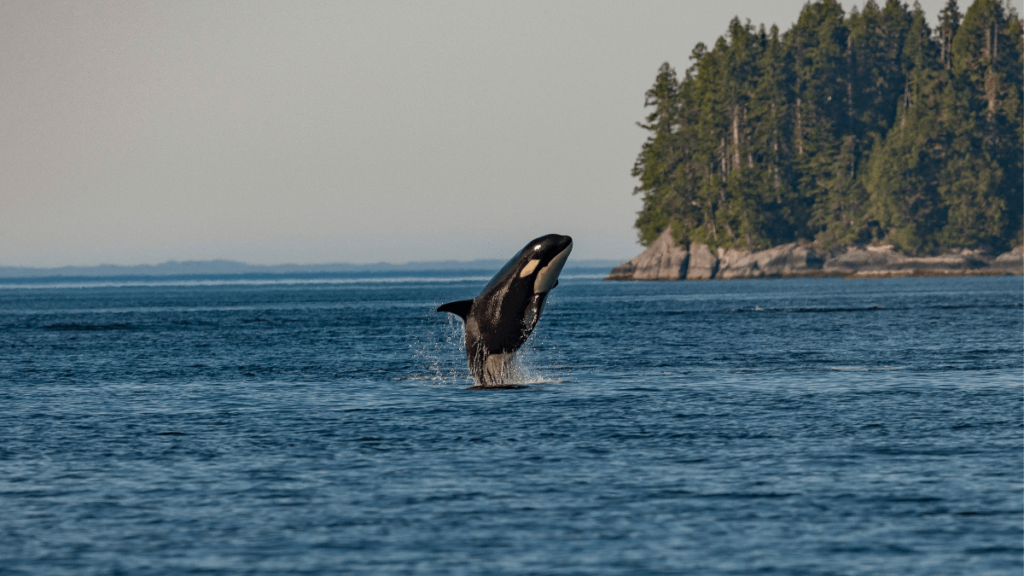The great white shark is the world’s largest macro predatory fish and, in essence, an apex predator. It’s so large and powerful that no other marine creature is capable of taking it on, and it can cruise the oceans safe in the knowledge that it is top dog (figuratively speaking).
That would all be true except for the existence of one pesky cetacean – the orca. But who would win between an orca vs great white? It’s a hot topic indeed!
While the orca doesn’t technically count as a ‘predator’ of great white sharks (they generally don’t hunt or eat them), they are bigger and stronger, and they employ pack tactics that work in opposition to the great white’s solitary nature.
They have, in addition, been observed killing great whites and eating their livers. So the truth is that although orcas are not regular predators of the great white, they don’t mind making the most of the opportunity to kill one.
Let’s take a look at the relationship between these two mighty kings of the ocean, the differences between them, and who wins between an orca vs great white!
Orca vs Great White in Size
We already gave the answer to this one away up above, but for posterity’s sake, let’s run the numbers on these two ocean beasts.
Great whites are, as mentioned, the world’s largest macro predatory fish, topped only by whale and basking sharks.
Males are the smaller of the two sexes, reaching sizes of 3.4-4m (11-13ft), while females typically reach lengths of 4.6-4.9m (15-16ft). The biggest great white ever recorded came in at a whopping 20ft (6.1m)!
Orcas, on the other hand, are much larger. Unlike great whites, the males are the larger of the sexes, reaching sizes of 6-8m (20-26ft). Female orcas are still bigger than most great whites, with lengths of between 5-6m (16-23ft).
In a very predictable outcome, then, orcas easily take the title of the larger ocean predator.
Speed
Marine animals generally have two speeds worth considering – their cruising speed (which is a little like walking for us) and their burst speed (used for hunting or to escape danger).
The great white is a fairly swift fish for its size, with a cruising speed of 3-5mph. Even that leisurely speed matches our greatest Olympic swimmers, of course – Michael Phelps has a top speed of around 5.3mph. And it’s worth remembering that great whites can maintain that speed indefinitely.

When it comes to burst speed, great whites are frighteningly fast – as many a seal could attest to if they could speak (and hadn’t been eaten). When necessary, these fearsome ocean killers can reach speeds of up to 35mph.
Orcas are also very speedy creatures, with a much faster cruising speed than that of a great white – about 8mph. Also, like great whites, they can maintain this speed pretty much indefinitely.
However, when it comes to burst speed, the orca is pipped at the post by the great white. Orcas can reach around 30mph – losing out to the great white by a mere 5mph.
The great white and the orca, then, are the tortoise and the hare of the ocean – when it comes to flashy bursts of speed, the great white has the edge. In terms of slow and steady, though, the orcas are less slow but definitely more steady.
Do Killer Whales Eat Sharks?
Great whites are, as mentioned, macro predatory, which means that they eat large prey. They prefer high-fat targets, as fat is nutrient-rich and can keep them going for longer. They, therefore, prefer marine mammals such as seals and whales. They will also eat sea turtles and other sharks, however.
Orcas are also predatory, but their eating habits are much more diverse and vary from region to region. Their prey includes fish, cephalopods (such as octopuses and squid), sea turtles, marine mammals, and seabirds.
Orcas are, additionally, pack hunters and have often been called the ‘wolves of the sea’. This pack hunting allows them to sometimes take down the world’s largest animal – the blue whale.
As this is a dangerous and time-consuming hunt, however, they prefer to go after calves rather than full-grown animals.
Orcas are also the only animal known to predate great whites. Due to their size and their pack hunting, orcas are the only predatory marine mammal capable of taking on the great white. Their preferred method of incapacitating the shark (and their eating habits towards them) is something that we’ll get to below
Who Would Win in a Fight?
This is not something that we have to speculate on – orcas and great whites do interact violently in the wild, and there are even instances of orca-great white fights on video, as can be seen below:
The short answer is that the orca wins every time. It’s bigger, heavier, and stronger than the great white, and there simply isn’t much that the smaller animal can do against the intimidating orca. And this is, of course, assuming a single orca versus a single great white.
As orcas are pack hunters, however, it’s pretty much unheard of for them to be found alone. That means that when orcas interact with great whites in the real world, they not only have a size advantage – they have a numbers one, too. And that pretty much means curtains for the great white.
Orcas are not only big and strong, but their also smart, and they realize that a great white can do some serious damage to them if they take it head-on. Their method of killing a great white, then, is as clever as it is cold and calculating.
”Great whites have very good reasons to fear the orca.”
The orcas simply upend the shark, inducing a state called tonic immobility. While in this state, the shark is essentially paralyzed and can do nothing to defend itself.
The orcas can then either wait for the shark to drown or immediately remove and eat its liver – which they do by making an incision above the liver, then squeezing the shark like a tube of toothpaste until its liver pops out.
The victor in any shark-orca confrontation, then, is obvious – the orca is the clear winner.
So, Who Wins Between a Killer Whale vs Great White Shark?
As we can see, great whites have very good reasons to fear the orca. This terrifying dolphin (yes, it’s technically a dolphin) is bigger, stronger, smarter, and hunts in packs.

The only thing a great white can do is try to outrun an orca pack or dive deep enough that an orca can’t follow for too long (remember that orcas breathe air).
However, a great white is known for many things, but its tactical nous is not one of them. It’s, therefore, very likely that any great white that an orca pod sets after is a dead one.
